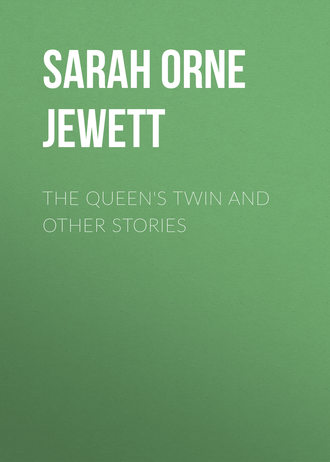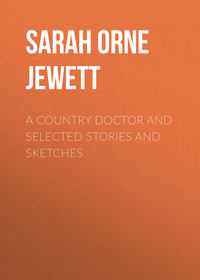 полная версия
полная версияThe Queen's Twin and Other Stories
Mrs. Todd was always Mrs. Todd, too great and self-possessed a soul for any occasion to ruffle. I admired her calmness, and presently the slow current of neighborhood talk carried one easily along; we spoke of the weather and the small adventures of the way, and then, as if I were after all not a stranger, our hostess turned almost affectionately to speak to me.
"The weather will be growing dark in London now. I expect that you 've been in London, dear?" she said.
"Oh, yes," I answered. "Only last year."
"It is a great many years since I was there, along in the forties," said Mrs. Martin. "'T was the only voyage I ever made; most of my neighbors have been great travelers. My brother was master of a vessel, and his wife usually sailed with him; but that year she had a young child more frail than the others, and she dreaded the care of it at sea. It happened that my brother got a chance for my husband to go as supercargo, being a good accountant, and came one day to urge him to take it; he was very ill-disposed to the sea, but he had met with losses, and I saw my own opportunity and persuaded them both to let me go too. In those days they did n't object to a woman's being aboard to wash and mend, the voyages were sometimes very long. And that was the way I come to see the Queen."
Mrs. Martin was looking straight in my eyes to see if I showed any genuine interest in the most interesting person in the world.
"Oh, I am very glad you saw the Queen," I hastened to say. "Mrs. Todd has told me that you and she were born the very same day."
"We were indeed, dear!" said Mrs. Martin, and she leaned back comfortably and smiled as she had not smiled before. Mrs. Todd gave a satisfied nod and glance, as if to say that things were going on as well as possible in this anxious moment.
"Yes," said Mrs. Martin again, drawing her chair a little nearer, "'t was a very remarkable thing; we were born the same day, and at exactly the same hour, after you allowed for all the difference in time. My father figured it out sea-fashion. Her Royal Majesty and I opened our eyes upon this world together; say what you may, 't is a bond between us."
Mrs. Todd assented with an air of triumph, and untied her hat-strings and threw them back over her shoulders with a gallant air.
"And I married a man by the name of Albert, just the same as she did, and all by chance, for I did n't get the news that she had an Albert too till a fortnight afterward; news was slower coming then than it is now. My first baby was a girl, and I called her Victoria after my mate; but the next one was a boy, and my husband wanted the right to name him, and took his own name and his brother Edward's, and pretty soon I saw in the paper that the little Prince o' Wales had been christened just the same. After that I made excuse to wait till I knew what she 'd named her children. I did n't want to break the chain, so I had an Alfred, and my darling Alice that I lost long before she lost hers, and there I stopped. If I 'd only had a dear daughter to stay at home with me, same's her youngest one, I should have been so thankful! But if only one of us could have a little Beatrice, I 'm glad 't was the Queen; we 've both seen trouble, but she 's had the most care."
I asked Mrs. Martin if she lived alone all the year, and was told that she did except for a visit now and then from one of her grandchildren, "the only one that really likes to come an' stay quiet 'long o' grandma. She always says quick as she's through her schoolin' she's goin' to live with me all the time, but she 's very pretty an' has taking ways," said Mrs. Martin, looking both proud and wistful, "so I can tell nothing at all about it! Yes, I 've been alone most o' the time since my Albert was taken away, and that's a great many years; he had a long time o' failing and sickness first." (Mrs. Todd's foot gave an impatient scuff on the floor.) "An' I 've always lived right here. I ain't like the Queen's Majesty, for this is the only palace I 've got," said the dear old thing, smiling again. "I 'm glad of it too, I don't like changing about, an' our stations in life are set very different. I don't require what the Queen does, but sometimes I 've thought 't was left to me to do the plain things she don't have time for. I expect she's a beautiful housekeeper, nobody could n't have done better in her high place, and she's been as good a mother as she 's been a queen."
"I guess she has, Abby," agreed Mrs. Todd instantly. "How was it you happened to get such a good look at her? I meant to ask you again when I was here t' other day."
"Our ship was layin' in the Thames, right there above Wapping. We was dischargin' cargo, and under orders to clear as quick as we could for Bordeaux to take on an excellent freight o' French goods," explained Mrs. Martin eagerly. "I heard that the Queen was goin' to a great review of her army, and would drive out o' her Buckin'ham Palace about ten o'clock in the mornin', and I run aft to Albert, my husband, and brother Horace where they was standin' together by the hatchway, and told 'em they must one of 'em take me. They laughed, I was in such a hurry, and said they could n't go; and I found they meant it and got sort of impatient when I began to talk, and I was 'most broken-hearted; 't was all the reason I had for makin' that hard voyage. Albert could n't help often reproachin' me, for he did so resent the sea, an' I 'd known how 't would be before we sailed; but I 'd minded nothing all the way till then, and I just crep' back to my cabin an' begun to cry. They was disappointed about their ship's cook, an' I 'd cooked for fo'c's'le an' cabin myself all the way over; 't was dreadful hard work, specially in rough weather; we 'd had head winds an' a six weeks' voyage. They 'd acted sort of ashamed o' me when I pled so to go ashore, an' that hurt my feelin's most of all. But Albert come below pretty soon; I 'd never given way so in my life, an' he begun to act frightened, and treated me gentle just as he did when we was goin' to be married, an' when I got over sobbin' he went on deck and saw Horace an' talked it over what they could do; they really had their duty to the vessel, and could n't be spared that day. Horace was real good when he understood everything, and he come an' told me I 'd more than worked my passage an' was goin' to do just as I liked now we was in port. He 'd engaged a cook, too, that was comin' aboard that mornin', and he was goin' to send the ship's carpenter with me—a nice fellow from up Thomaston way; he 'd gone to put on his ashore clothes as quick's he could. So then I got ready, and we started off in the small boat and rowed up river. I was afraid we were too late, but the tide was setting up very strong, and we landed an' left the boat to a keeper, and I run all the way up those great streets and across a park. 'Twas a great day, with sights o' folks everywhere, but 't was just as if they was nothin' but wax images to me. I kep' askin' my way an' runnin' on, with the carpenter comin' after as best he could, and just as I worked to the front o' the crowd by the palace, the gates was flung open and out she came; all prancin' horses and shinin' gold, and in a beautiful carriage there she sat; 't was a moment o' heaven to me. I saw her plain, and she looked right at me so pleasant and happy, just as if she knew there was somethin' different between us from other folks."
There was a moment when the Queen's Twin could not go on and neither of her listeners could ask a question.
"Prince Albert was sitting right beside her in the carriage," she continued. "Oh, he was a beautiful man! Yes, dear, I saw 'em both together just as I see you now, and then she was gone out o' sight in another minute, and the common crowd was all spread over the place pushin' an' cheerin'. 'T was some kind o' holiday, an' the carpenter and I got separated, an' then I found him again after I did n't think I should, an' he was all for makin' a day of it, and goin' to show me all the sights; he 'd been in London before, but I did n't want nothin' else, an' we went back through the streets down to the waterside an' took the boat. I remember I mended an old coat o' my Albert's as good as I could, sittin' on the quarter-deck in the sun all that afternoon, and 't was all as if I was livin' in a lovely dream. I don't know how to explain it, but there hasn't been no friend I've felt so near to me ever since."
One could not say much—only listen. Mrs. Todd put in a discerning question now and then, and Mrs. Martin's eyes shone brighter and brighter as she talked. What a lovely gift of imagination and true affection was in this fond old heart! I looked about the plain New England kitchen, with its wood-smoked walls and homely braided rugs on the worn floor, and all its simple furnishings. The loud-ticking clock seemed to encourage us to speak; at the other side of the room was an early newspaper portrait of Her Majesty the Queen of Great Britain and Ireland. On a shelf below were some flowers in a little glass dish, as if they were put before a shrine.
"If I could have had more to read, I should have known 'most everything about her," said Mrs. Martin wistfully. "I 've made the most of what I did have, and thought it over and over till it came clear. I sometimes seem to have her all my own, as if we 'd lived right together. I 've often walked out into the woods alone and told her what my troubles was, and it always seemed as if she told me 't was all right, an' we must have patience. I 've got her beautiful book about the Highlands; 't was dear Mis' Todd here that found out about her printing it and got a copy for me, and it's been a treasure to my heart, just as if 't was written right to me. I always read it Sundays now, for my Sunday treat. Before that I used to have to imagine a good deal, but when I come to read her book, I knew what I expected was all true. We do think alike about so many things," said the Queen's Twin with affectionate certainty. "You see, there is something between us, being born just at the some time; 't is what they call a birthright. She 's had great tasks put upon her, being the Queen, an' mine has been the humble lot; but she's done the best she could, nobody can say to the contrary, and there 's something between us; she's been the great lesson I 've had to live by. She's been everything to me. An' when she had her Jubilee, oh, how my heart was with her!"
"There, 't would n't play the part in her life it has in mine," said Mrs. Martin generously, in answer to something one of her listeners had said. "Sometimes I think, now she's older, she might like to know about us. When I think how few old friends anybody has left at our age, I suppose it may be just the same with her as it is with me; perhaps she would like to know how we came into life together. But I 've had a great advantage in seeing her, an' I can always fancy her goin' on, while she don't know nothin' yet about me, except she may feel my love stayin' her heart sometimes an' not know just where it comes from. An' I dream about our being together out in some pretty fields, young as ever we was, and holdin' hands as we walk along. I 'd like to know if she ever has that dream too. I used to have days when I made believe she did know, an' was comin' to see me," confessed the speaker shyly, with a little flush on her cheeks; "and I 'd plan what I could have nice for supper, and I was n't goin' to let anybody know she was here havin' a good rest, except I 'd wish you, Almira Todd, or dear Mis' Blackett would happen in, for you 'd know just how to talk with her. You see, she likes to be up in Scotland, right out in the wild country, better than she does anywhere else."
"I 'd really love to take her out to see mother at Green Island," said Mrs. Todd with a sudden impulse.
"Oh, yes! I should love to have you," exclaimed Mrs. Martin, and then she began to speak in a lower tone. "One day I got thinkin' so about my dear Queen," she said, "an' livin' so in my thoughts, that I went to work an' got all ready for her, just as if she was really comin'. I never told this to a livin' soul before, but I feel you 'll understand. I put my best fine sheets and blankets I spun an' wove myself on the bed, and I picked some pretty flowers and put 'em all round the house, an' I worked as hard an' happy as I could all day, and had as nice a supper ready as I could get, sort of telling myself a story all the time. She was comin' an' I was goin' to see her again, an' I kep' it up until nightfall; an' when I see the dark an' it come to me I was all alone, the dream left me, an' I sat down on the doorstep an' felt all foolish an' tired. An', if you 'll believe it, I heard steps comin', an' an old cousin o' mine come wanderin' along, one I was apt to be shy of. She was n't all there, as folks used to say, but harmless enough and a kind of poor old talking body. And I went right to meet her when I first heard her call, 'stead o' hidin' as I sometimes did, an' she come in dreadful willin', an' we sat down to supper together; 't was a supper I should have had no heart to eat alone."
"I don't believe she ever had such a splendid time in her life as she did then. I heard her tell all about it afterwards," exclaimed Mrs. Todd compassionately. "There, now I hear all this it seems just as if the Queen might have known and could n't come herself, so she sent that poor old creatur' that was always in need!"
Mrs. Martin looked timidly at Mrs. Todd and then at me. "'T was childish o' me to go an' get supper," she confessed.
"I guess you wa'n't the first one to do that," said Mrs. Todd. "No, I guess you wa'n't the first one who 's got supper that way, Abby," and then for a moment she could say no more.
Mrs. Todd and Mrs. Martin had moved their chairs a little so that they faced each other, and I, at one side, could see them both.
"No, you never told me o' that before, Abby," said Mrs. Todd gently. "Don't it show that for folks that have any fancy in 'em, such beautiful dreams is the real part o' life? But to most folks the common things that happens outside 'em is all in all."
Mrs. Martin did not appear to understand at first, strange to say, when the secret of her heart was put into words; then a glow of pleasure and comprehension shone upon her face. "Why, I believe you 're right, Almira!" she said, and turned to me.
"Wouldn't you like to look at my pictures of the Queen?" she asked, and we rose and went into the best room.
V
The mid-day visit seemed very short; September hours are brief to match the shortening days. The great subject was dismissed for a while after our visit to the Queen's pictures, and my companions spoke much of lesser persons until we drank the cup of tea which Mrs. Todd had foreseen. I happily remembered that the Queen herself is said to like a proper cup of tea, and this at once seemed to make her Majesty kindly join so remote and reverent a company. Mrs. Martin's thin cheeks took on a pretty color like a girl's. "Somehow I always have thought of her when I made it extra good," she said. "I 've got a real china cup that belonged to my grandmother, and I believe I shall call it hers now."
"Why don't you?" responded Mrs. Todd warmly, with a delightful smile.
Later they spoke of a promised visit which was to be made in the Indian summer to the Landing and Green Island, but I observed that Mrs. Todd presented the little parcel of dried herbs, with full directions, for a cure-all in the spring, as if there were no real chance of their meeting again first. As we looked back from the turn of the road the Queen's Twin was still standing on the doorstep watching us away, and Mrs. Todd stopped, and stood still for a moment before she waved her hand again.
"There's one thing certain, dear," she said to me with great discernment; "it ain't as if we left her all alone!"
Then we set out upon our long way home over the hill, where we lingered in the afternoon sunshine, and through the dark woods across the heron-swamp.
A DUNNET SHEPHERDESS
I
Early one morning at Dunnet Landing, as if it were still night, I waked, suddenly startled by a spirited conversation beneath my window. It was not one of Mrs. Todd's morning soliloquies; she was not addressing her plants and flowers in words of either praise or blame. Her voice was declamatory though perfectly good-humored, while the second voice, a man's, was of lower pitch and somewhat deprecating.
The sun was just above the sea, and struck straight across my room through a crack in the blind. It was a strange hour for the arrival of a guest, and still too soon for the general run of business, even in that tiny eastern haven where daybreak fisheries and early tides must often rule the day.
The man's voice suddenly declared itself to my sleepy ears. It was Mr.
William Blackett's.
"Why, sister Almiry," he protested gently, "I don't need none o' your nostrums!"
"Pick me a small han'ful," she commanded. "No, no, a small han'ful, I said,—o' them large pennyr'yal sprigs! I go to all the trouble an' cossetin' of 'em just so as to have you ready to meet such occasions, an' last year, you may remember, you never stopped here at all the day you went up country. An' the frost come at last an' blacked it. I never saw any herb that so objected to gardin ground; might as well try to flourish mayflowers in a common front yard. There, you can come in now, an' set and eat what breakfast you 've got patience for. I 've found everything I want, an' I 'll mash 'em up an' be all ready to put 'em on."
I heard such a pleading note of appeal as the speakers went round the corner of the house, and my curiosity was so demanding, that I dressed in haste, and joined my friends a little later, with two unnoticed excuses of the beauty of the morning, and the early mail boat. William's breakfast had been slighted; he had taken his cup of tea and merely pushed back the rest on the kitchen table. He was now sitting in a helpless condition by the side window, with one of his sister's purple calico aprons pinned close about his neck. Poor William was meekly submitting to being smeared, as to his countenance, with a most pungent and unattractive lotion of pennyroyal and other green herbs which had been hastily pounded and mixed with cream in the little white stone mortar.
I had to cast two or three straightforward looks at William to reassure myself that he really looked happy and expectant in spite of his melancholy circumstances, and was not being overtaken by retribution. The brother and sister seemed to be on delightful terms with each other for once, and there was something of cheerful anticipation in their morning talk. I was reminded of Medea's anointing Jason before the great episode of the iron bulls, but to-day William really could not be going up country to see a railroad for the first time. I knew this to be one of his great schemes, but he was not fitted to appear in public, or to front an observing world of strangers. As I appeared he essayed to rise, but Mrs. Todd pushed him back into the chair.
"Set where you be till it dries on," she insisted. "Land sakes, you'd think he'd get over bein' a boy some time or 'nother, gettin' along in years as he is. An' you 'd think he 'd seen full enough o' fish, but once a year he has to break loose like this, an' travel off way up back o' the Bowden place—far out o' my beat, 'tis—an' go a trout fishin'!"
Her tone of amused scorn was so full of challenge that William changed color even under the green streaks.
"I want some change," he said, looking at me and not at her. "'T is the prettiest little shady brook you ever saw."
"If he ever fetched home more 'n a couple o' minnies, 't would seem worth while," Mrs. Todd concluded, putting a last dab of the mysterious compound so perilously near her brother's mouth that William flushed again and was silent.
A little later I witnessed his escape, when Mrs. Todd had taken the foolish risk of going down cellar. There was a horse and wagon outside the garden fence, and presently we stood where we could see him driving up the hill with thoughtless speed. Mrs. Todd said nothing, but watched him affectionately out of sight.
"It serves to keep the mosquitoes off," she said, and a moment later it occurred to my slow mind that she spoke of the penny-royal lotion. "I don't know sometimes but William's kind of poetical," she continued, in her gentlest voice. "You 'd think if anything could cure him of it, 't would be the fish business."
It was only twenty minutes past six on a summer morning, but we both sat down to rest as if the activities of the day were over. Mrs. Todd rocked gently for a time, and seemed to be lost, though not poorly, like Macbeth, in her thoughts. At last she resumed relations with her actual surroundings. "I shall now put my lobsters on. They'll make us a good supper," she announced. "Then I can let the fire out for all day; give it a holiday, same's William. You can have a little one now, nice an' hot, if you ain't got all the breakfast you want. Yes, I 'll put the lobsters on. William was very thoughtful to bring 'em over; William is thoughtful; if he only had a spark o' ambition, there be few could match him."
This unusual concession was afforded a sympathetic listener from the depths of the kitchen closet. Mrs. Todd was getting out her old iron lobster pot, and began to speak of prosaic affairs. I hoped that I should hear something more about her brother and their island life, and sat idly by the kitchen window looking at the morning glories that shaded it, believing that some flaw of wind might set Mrs. Todd's mind on its former course. Then it occurred to me that she had spoken about our supper rather than our dinner, and I guessed that she might have some great scheme before her for the day.
When I had loitered for some time and there was no further word about William, and at last I was conscious of receiving no attention whatever, I went away. It was something of a disappointment to find that she put no hindrance in the way of my usual morning affairs, of going up to the empty little white schoolhouse on the hill where I did my task of writing. I had been almost sure of a holiday when I discovered that Mrs. Todd was likely to take one herself; we had not been far afield to gather herbs and pleasures for many days now, but a little later she had silently vanished. I found my luncheon ready on the table in the little entry, wrapped in its shining old homespun napkin, and as if by way of special consolation, there was a stone bottle of Mrs. Todd's best spruce beer, with a long piece of cod line wound round it by which it could be lowered for coolness into the deep schoolhouse well.
I walked away with a dull supply of writing-paper and these provisions, feeling like a reluctant child who hopes to be called back at every step. There was no relenting voice to be heard, and when I reached the schoolhouse, I found that I had left an open window and a swinging shutter the day before, and the sea wind that blew at evening had fluttered my poor sheaf of papers all about the room.
So the day did not begin very well, and I began to recognize that it was one of the days when nothing could be done without company. The truth was that my heart had gone trouting with William, but it would have been too selfish to say a word even to one's self about spoiling his day. If there is one way above another of getting so close to nature that one simply is a piece of nature, following a primeval instinct with perfect self-forgetfulness and forgetting everything except the dreamy consciousness of pleasant freedom, it is to take the course of a shady trout brook. The dark pools and the sunny shallows beckon one on; the wedge of sky between the trees on either bank, the speaking, companioning noise of the water, the amazing importance of what one is doing, and the constant sense of life and beauty make a strange transformation of the quick hours. I had a sudden memory of all this, and another, and another. I could not get myself free from "fishing and wishing."
At that moment I heard the unusual sound of wheels, and I looked past the high-growing thicket of wild-roses and straggling sumach to see the white nose and meagre shape of the Caplin horse; then I saw William sitting in the open wagon, with a small expectant smile upon his face.
"I 've got two lines," he said. "I was quite a piece up the road. I thought perhaps 't was so you 'd feel like going."
There was enough excitement for most occasions in hearing William speak three sentences at once. Words seemed but vain to me at that bright moment. I stepped back from the schoolhouse window with a beating heart. The spruce-beer bottle was not yet in the well, and with that and my luncheon, and Pleasure at the helm, I went out into the happy world. The land breeze was blowing, and, as we turned away, I saw a flutter of white go past the window as I left the schoolhouse and my morning's work to their neglected fate.






